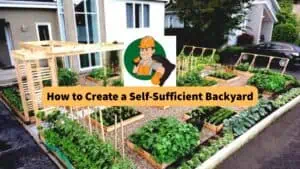When downsizing at 80, start early to decide what to keep, organize important documents, and select personal items with care. Also, handle keepsakes, redistribute belongings thoughtfully, and consider both physical and emotional needs on moving day. Finally, adapt smoothly to your new home.
Learn more about these 7 tips for downsizing at 80 in our article below.
#1: Early Engagement and Planning
Beginning the process of downsizing your home well ahead of time is very important. When you start early, you give yourself plenty of time to think about what you really need and what you can let go of.
This makes the job easier, and it cuts down on the stress that comes from having to rush through everything. Early planning means you can go through your things at your own pace, decide what’s important to keep, and make the entire moving process more manageable.
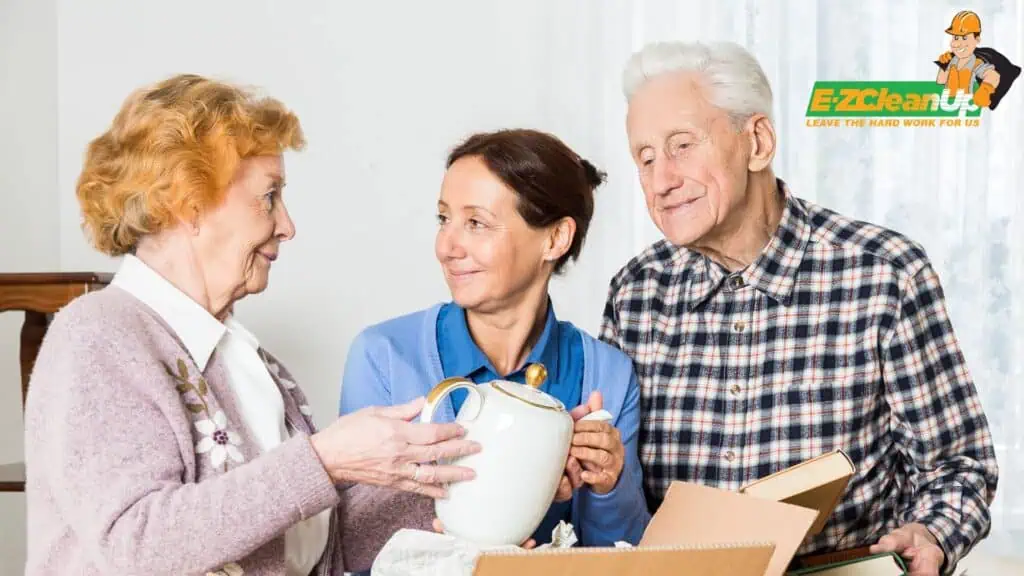
Get Help from Friends and Family
Bringing family and friends into your downsizing journey can make a big difference. They can offer emotional support and help turn this task into something special. With loved ones around, you can share memories as you sort through old belongings.
They can also help with the physical work, like packing boxes or deciding which items to keep. This makes the process less overwhelming and adds a layer of warmth and shared experiences to the task.
Here are the steps to follow at this stage of downsizing:
- Consider Hiring Professional Movers: If the physical part of moving seems too challenging, think about hiring professional movers who have experience with senior relocations. These experts know how to handle the specific needs of seniors and can ensure that everything goes smoothly, from packing your belongings to moving them safely to your new home.
- Prepare Emotionally: It’s normal to have mixed feelings about leaving a place where you’ve lived for a long time. Allow yourself to feel sad or nostalgic, but also try to look forward to the new experiences and memories you’ll create in your new home. Giving yourself time to adjust emotionally is just as important as the physical preparations for moving.
#2: Secure and Organize Important Documents
For anyone, especially seniors, organizing important documents like wills, medical records, and insurance policies is a key step when downsizing. These documents are essential and should be kept in a safe but easily accessible spot.
This helps prevent stress during the moving process. It’s a good idea to put all these important papers in one specific place that’s clearly marked. This way, there’s no confusion or chance of losing anything important during the move.
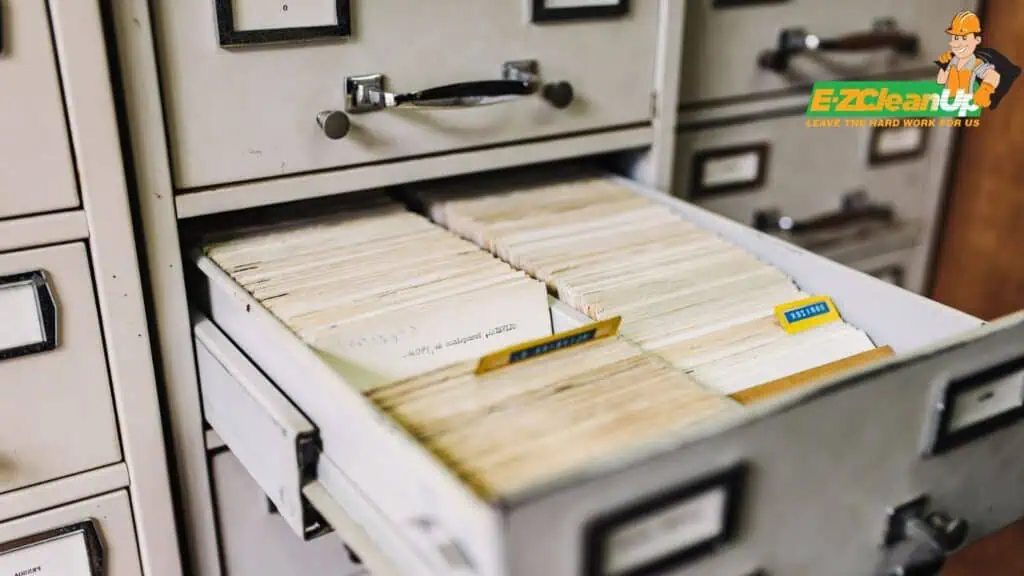
Make Access Simple
Not everyone is comfortable using digital technology to manage documents, especially some seniors who might find new technologies challenging. Keeping physical copies in clearly labeled folders is a practical solution.
These folders can be stored in a safe spot, like a lockable filing cabinet or a fireproof safe. This keeps them secure from accidents while also making sure they are easy to get to when needed.
- Use Dedicated Storage: Investing in a fireproof safe or a secure filing cabinet just for your important documents is a wise choice. This keeps them protected from potential disasters like fires or floods.
- Label Clearly: Make sure each folder is clearly labeled with what’s inside. You might want to use large print for the labels so they’re easier to read.
- Centralize Document Locations: Keep all your important documents in one easy-to-remember place. This avoids the hassle of searching for them during the moving process. It ensures everything is where you expect it to be.
#3: Strategic Selection of Personal Items
Focus on things that mean a lot to you or that you use every day. This makes deciding what to take to your new home easier and ensures you keep the things that make you happiest.
Giving Heirlooms to Family
Handing down treasured items to family members before you move can be both heartwarming and practical. It allows you to see your family enjoy these special things and also helps clear out your space.
Key Tips for Downsizing Personal Items
- Evaluate What You Use and Love: Keep items that you need every day or that bring you a lot of happiness.
- Talk to Your Family Early: Discuss which heirloom items family members might appreciate the most.
- Be Thoughtful with Gifts: Give away items that will be used and valued, not just stored away. Focusing on the importance of each item helps make the downsizing process less difficult and more rewarding.
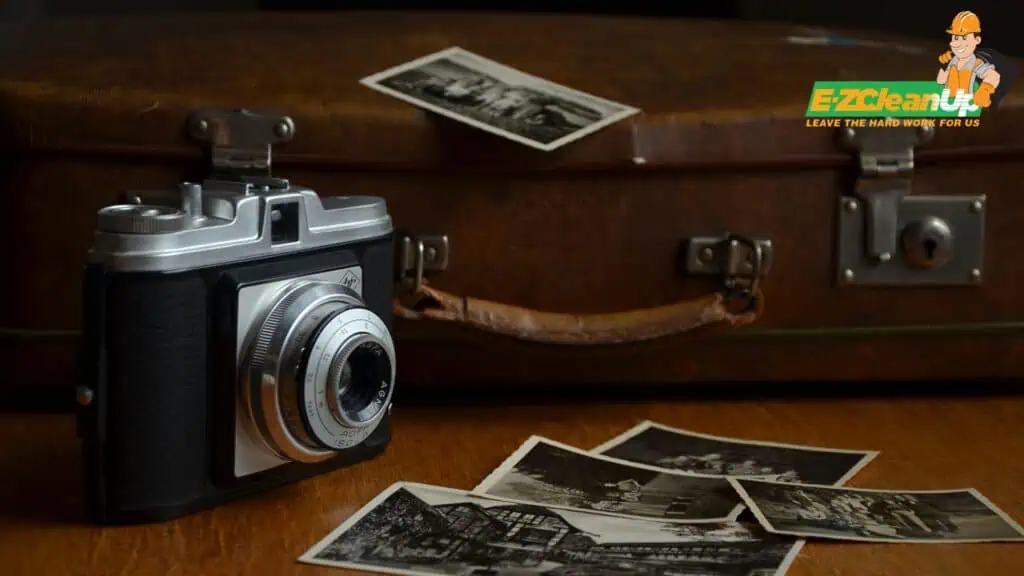
#4: Handling Keepsakes with Care
Having family help out can turn this task into a fun activity that brings everyone closer. It’s a chance to share memories and have younger, tech-savvy members handle the technical side.
If family help isn’t an option, there are professional services that specialize in digitizing photos and videos. These services take care of everything from scanning to online sharing. They ensure that these precious memories are preserved for the future.
Moreover, some community centers or libraries offer workshops on how to digitize and preserve photos. These workshops are great for learning and getting access to the right equipment.

#5: Efficient Disposal and Redistribution of Belongings
Encouraging seniors to have a family day to go through belongings can make downsizing a shared and memorable experience. Having loved ones help pick items to keep or take home can make this process feel less overwhelming for seniors.
This way, items get a new life with someone who appreciates them, which can make parting with them easier.
Donating with Purpose
When it’s time to donate, it’s important to do it thoughtfully. Seniors should collaborate with family or caregivers to pick out items that aren’t needed anymore.
Finding charities or community centers that could really use these items makes the donation meaningful. This clears out space while ensuring that these items help others in the community.
Strategies for Redistributing Items
- Family Input: Getting family involved early helps make decisions about what to keep, donate, or throw away more thoughtfully.
- Keep a Record: Taking photos and keeping a list of items that are being given away or sold helps keep track of what goes where and maintains a sentimental connection to those items.
#6: Physical and Emotional Considerations for Moving Day
Choosing the right movers is crucial for a stress-free moving day for seniors. It’s essential to select a moving company that specializes in senior relocations, as they are experienced in addressing specific needs such as careful handling of belongings and efficient moving processes.
Choose companies that offer comprehensive services, including estate sales and setting up the new home, to ease the transition.
Ensure Emotional Comfort
Moving can be emotionally tough for seniors. To help with this, it’s good to give seniors plenty of time to get used to the idea of moving. Talking openly about any worries or feelings about the move can also help.
Some moving companies that focus on senior moves have staff trained to deal with these emotional challenges. They make sure the move feels supportive and understanding.
Effective Strategies for a Smooth Move
- Early Engagement: Involve seniors in the planning process early to help them feel in control and reassured.
- Clear Communication: Maintain open lines of communication with movers and family members to ensure all emotional and physical needs are addressed.
- Post-Move Support: After the move, consider arranging visits from family or friends to help the senior settle into their new environment. This can alleviate feelings of isolation or disorientation.

#7: Adapting to a New Home
After moving, it helps to introduce seniors to their new home slowly. With help from family or caregivers, seniors can take their time getting to know their new environment.
Local senior centers or groups can also help by offering tours and programs that introduce seniors to what’s available in their new community.
Make New Friends
It’s really important for seniors to get involved in community activities or events to make new friends and build a support network. This is great for their mental and emotional health.
Joining clubs, classes, or volunteering helps seniors meet people and become part of the community, which can make them feel more at home and valued.
Tips for Feeling at Home in a New Community
- Get Involved with Local Senior Centers: These places often have lots of activities tailored to seniors. It’s a perfect way to meet people and have fun.
- Join Interest Groups: Being part of a group, like a book club or a gardening club, can connect seniors with others who share their interests.
- Use Technology: Encourage seniors to use technology to keep in touch with old friends and meet new ones. Many places offer classes on using social media safely, which can be a big help.
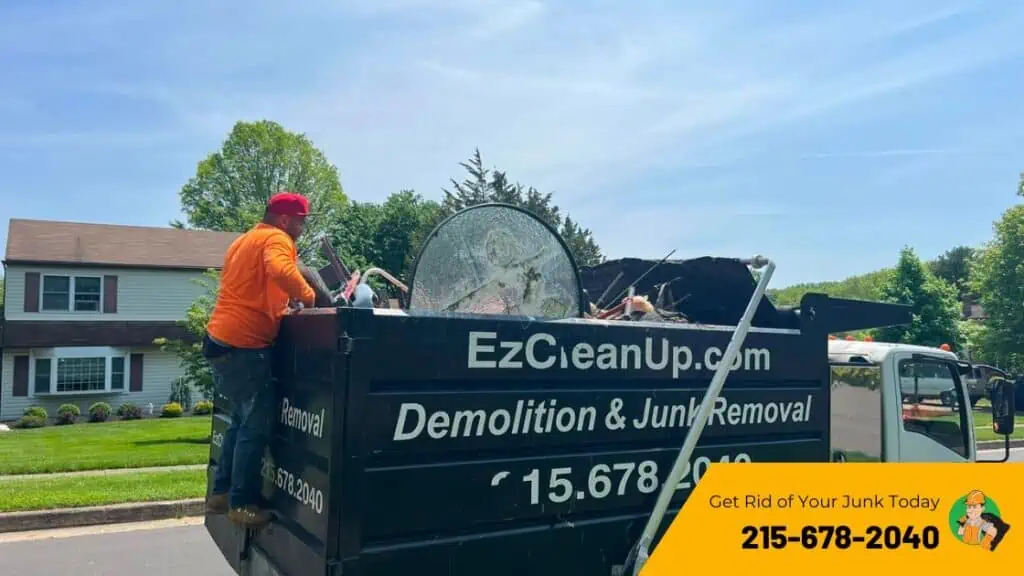
Transition Made Easy at 80
Downsizing at 80 requires a thoughtful approach to sorting and letting go of personal items. With EZ CleanUp, you can focus on the important decisions while we take care of the heavy lifting and disposal.
Our services are tailored to help seniors through the transition. We ensure that nothing is left behind unless intended. Call us to learn more about our services.








